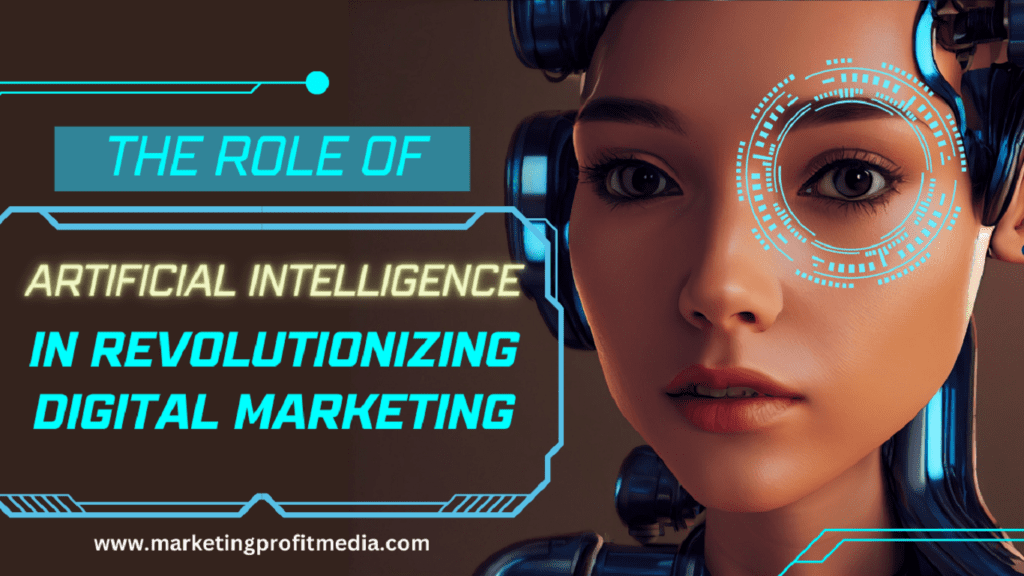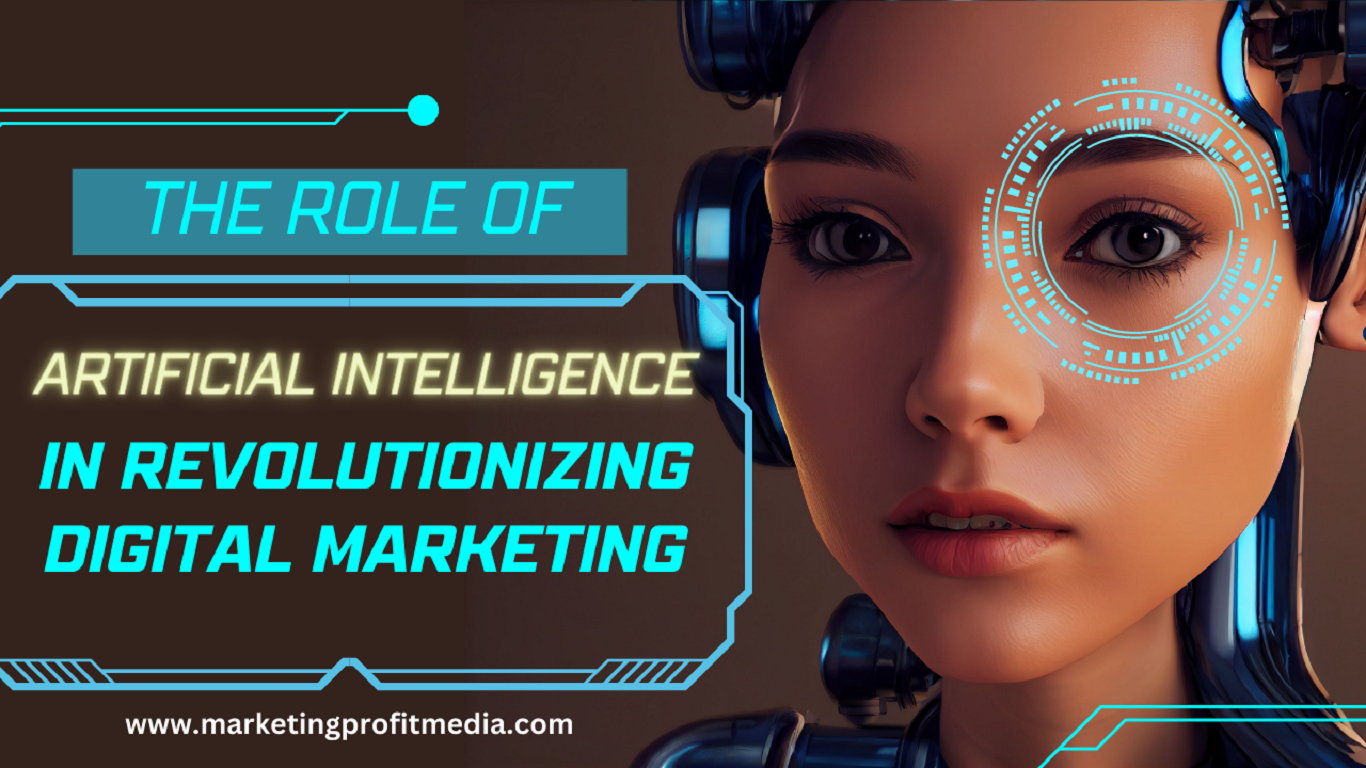Digital marketing is not an exception to how artificial intelligence (AI) has emerged as a game-changing technology that is altering numerous industries. Businesses are increasingly relying on digital marketing tactics in today’s hyperconnected environment to interact with and engage their target audiences. Digital marketers now have strong tools at their disposal to improve campaigns, improve consumer experiences, and produce outstanding outcomes thanks to the arrival of AI.
My Best Recommended & Proven Way to Make $100 Daily – Watch THIS FREE Training to START >>

AI has enabled digital marketers to scale the creation of customized experiences. Huge amounts of customer data may be examined by businesses using machine learning algorithms to discover valuable information about consumer behavior, preferences, and purchasing patterns. Utilizing this data, marketing campaigns are created that are very relevant and customer-focused.
Additionally, AI-powered analytics empower marketers to draw useful conclusions from large datasets in order to make data-driven decisions. Businesses may discover patterns, forecast customer behavior, and improve marketing campaigns using enhanced data analytic skills.
The usage of chatbots and virtual assistants in customer service is another way that AI is changing it. These clever programs can respond to inquiries right away, assist users with their purchases, and generally increase user engagement and pleasure.
In this post, we’ll explore the many ways that artificial intelligence is transforming digital marketing. We will investigate how AI drives customized customer experiences, sophisticated data analytics, chatbots and virtual assistants, improved targeting and ad campaigns, content development and optimization, as well as moral issues. Join us as we explore how AI will fundamentally alter the course of digital marketing.
1. Personalized Customer Experience
AI enables digital marketers to deliver tailored experiences to individual customers. By leveraging machine learning algorithms, businesses can analyze customer data and behavior, allowing them to create highly personalized marketing campaigns, product recommendations, and targeted offers. This level of customization enhances customer engagement, fosters brand loyalty, and drives conversions.
2. Advanced Data Analytics
AI empowers digital marketers with sophisticated data analytics capabilities. By leveraging AI algorithms, businesses can analyze vast amounts of data quickly and accurately. This enables them to extract actionable insights, identify trends, and make data-driven marketing decisions. Advanced data analytics fuels the optimization of marketing strategies for better results and ROI.
3. Chatbots and Virtual Assistants
AI-powered chatbots and virtual assistants have revolutionized customer service in digital marketing. These intelligent applications provide instant support, answer queries, and guide customers through their purchasing journey. Chatbots and virtual assistants enhance user experiences, streamline customer interactions, and can even contribute to lead generation and sales support.
4. Enhanced Targeting and Ad Campaigns
AI empowers digital marketers with precise targeting capabilities. By leveraging AI algorithms, businesses can identify and target specific audience segments with precision. This enables them to optimize ad campaigns, ensuring the right message reaches the right audience at the right time, resulting in improved reach, engagement, and conversion rates.
5. Content Creation and Optimization
AI algorithms are transforming content creation and optimization in digital marketing. Businesses can leverage AI to generate high-quality, relevant content at scale. Additionally, AI assists in keyword research and search engine optimization, enabling marketers to create content that resonates with their target audience and improves search engine rankings.
6. Ethical Considerations and Future Implications
As AI continues to revolutionize digital marketing, ethical considerations become paramount. Marketers must address issues such as transparency, data privacy, and bias mitigation to build trust with customers. Looking ahead, the future of AI in digital marketing holds exciting prospects, including advancements in personalization, enhanced customer experiences, and the need for robust ethical frameworks to ensure responsible AI implementation.
My Best Recommended & Proven Way to Make $100 Daily – Watch THIS FREE Training to START >>
Personalized Customer Experience
Providing a personalized customer experience has become crucial for businesses in the digital marketing landscape. With the power of AI, digital marketers can tailor their marketing efforts to meet the unique needs and preferences of individual customers. Here are key tips for leveraging AI to deliver a personalized customer experience:
- Leverage Data Insights: Utilize AI algorithms to analyze customer data and extract valuable insights. By understanding customer behavior, preferences, and purchase patterns, you can create targeted marketing campaigns that resonate with individual customers.
- Implement Recommendation Engines: Use AI-powered recommendation engines to offer personalized product recommendations. These engines can analyze customer preferences and past purchases to suggest relevant products, enhancing cross-selling and upselling opportunities.
- Optimize User Journeys: Use AI to understand the customer journey and identify pain points or areas for improvement. By analyzing user behavior, you can optimize website navigation, content placement, and design elements to create a seamless and personalized user experience.
- Implement Dynamic Content: Use AI to dynamically generate personalized content based on customer data and preferences. This could include personalized emails, website content, or product recommendations that align with each customer’s interests.
- Embrace Chatbots and Virtual Assistants: AI-powered chatbots and virtual assistants can provide instant support and personalized interactions with customers. These intelligent tools can answer queries, offer recommendations, and guide customers through their buying journey, enhancing satisfaction and engagement.
By incorporating these key tips, businesses can harness the power of AI to create a personalized customer experience that builds stronger connections, fosters brand loyalty, and ultimately drives conversions in the digital marketing landscape.
Advanced Data Analytics
In the world of digital marketing, data is king. And with the advent of AI, businesses now have the power to harness vast amounts of data and extract actionable insights to inform their marketing strategies. Here are key tips for leveraging advanced data analytics powered by AI:
- Data Integration: Integrate data from various sources, including customer interactions, website analytics, social media platforms, and sales data. By consolidating and analyzing this data using AI algorithms, you can gain a comprehensive view of your audience and their behavior.
- Predictive Analytics: Utilize AI-powered predictive analytics to forecast customer behavior and trends. By analyzing historical data, you can identify patterns and make informed predictions about future customer actions, allowing you to proactively optimize marketing campaigns and tailor offers.
- Real-Time Analysis: Leverage AI to analyze data in real-time, enabling you to respond quickly to changing market dynamics. By monitoring real-time data, you can identify emerging trends, track campaign performance, and make data-driven decisions on the fly.
- Personalization at Scale: Utilize AI algorithms to segment your audience and deliver personalized experiences at scale. By understanding individual preferences and behaviors, you can tailor your marketing messages, offers, and content to resonate with each customer, driving engagement and conversions.
- Automation and Optimization: Implement AI-powered automation tools to streamline data analysis processes. This allows you to save time, reduce manual errors, and optimize marketing campaigns based on real-time insights, improving efficiency and maximizing ROI.
By following these key tips, businesses can unlock the power of advanced data analytics enabled by AI. By leveraging data effectively, you can gain valuable insights, make data-driven decisions, and create highly targeted and personalized marketing strategies that drive results in the ever-evolving digital marketing landscape.
Chatbots and Virtual Assistants
In today’s fast-paced digital world, businesses strive to deliver seamless and efficient customer service. With the rise of AI, chatbots and virtual assistants have emerged as powerful tools to enhance customer interactions and drive engagement. Here are key tips for leveraging chatbots and virtual assistants powered by AI:
- Instant Support: Implement AI-powered chatbots and virtual assistants to provide instant support to customers. These intelligent applications can answer common queries, provide product information, and guide customers through their purchase journey, ensuring a smooth and efficient user experience.
- Natural Language Processing: Utilize AI algorithms with natural language processing capabilities to understand and respond to customer queries in a conversational manner. By offering human-like interactions, chatbots and virtual assistants can make customers feel heard and understood.
- Personalization: Leverage AI to personalize interactions with customers. By analyzing customer data, preferences, and purchase history, chatbots and virtual assistants can tailor recommendations, offers, and responses to each individual, creating a personalized and engaging experience.
- 24/7 Availability: Unlike human agents, chatbots and virtual assistants can operate round the clock. This means customers can receive support and assistance at any time, increasing customer satisfaction and reducing response times.
- Integration with CRM: Integrate chatbots and virtual assistants with your customer relationship management (CRM) system to capture and store valuable customer data. This integration enables seamless handoffs between the AI-powered assistants and human agents, ensuring a cohesive and personalized customer experience.
By following these key tips, businesses can leverage the power of AI-driven chatbots and virtual assistants to elevate their customer service and engagement. These intelligent tools provide instant support, personalized interactions, and 24/7 availability, enhancing the overall customer experience and driving customer satisfaction in the digital era.
Enhanced Targeting and Ad Campaigns
In the cluttered digital environment, capturing the attention of the right audience is crucial for the success of any marketing campaign. With the advent of AI, businesses now have powerful tools at their disposal to enhance targeting and optimize their ad campaigns for maximum impact. Here are key tips for leveraging AI to enhance targeting and drive successful ad campaigns:
- Audience Segmentation: Utilize AI algorithms to segment your audience based on demographics, behaviors, and preferences. By understanding the distinct characteristics of different audience segments, you can tailor your marketing messages and ad campaigns to resonate with specific groups, increasing relevance and engagement.
- Predictive Targeting: Leverage AI-powered predictive analytics to identify potential high-value customers and target them with precision. By analyzing historical data and customer behavior patterns, AI can help you predict the likelihood of a customer converting, allowing you to allocate your ad spend wisely.
- Dynamic Ad Personalization: Utilize AI to dynamically personalize ad content based on individual customer data. By tailoring the messaging, visuals, and offers to each customer’s preferences, you can deliver highly relevant and compelling ads that capture attention and drive conversions.
- Real-Time Ad Optimization: Leverage AI algorithms to continuously monitor and optimize your ad campaigns in real-time. By analyzing performance metrics, such as click-through rates, conversion rates, and engagement levels, AI can automatically adjust targeting parameters and optimize ad placements for better results.
- Multichannel Integration: Integrate AI-driven ad platforms across multiple channels to reach your audience wherever they are. AI can help you identify the most effective channels for your target audience, allowing you to allocate your resources strategically and maximize your ad campaign’s reach and impact.
By following these key tips, businesses can leverage AI to enhance targeting and optimize their ad campaigns for maximum effectiveness. With AI-driven audience segmentation, predictive targeting, dynamic personalization, real-time optimization, and multichannel integration, you can ensure that your ads are reaching the right people, at the right time, with the right message, resulting in improved engagement, conversions, and return on investment.
My Best Recommended & Proven Way to Make $100 Daily – Watch THIS FREE Training to START >>
Content Creation and Optimization
In the context of digital marketing, creating high-quality and engaging content is essential for capturing the attention of your target audience. With the power of AI, businesses can now take their content creation and optimization efforts to new heights. Here are key tips for leveraging AI in content creation and optimization:
- AI-Generated Content: Utilize AI algorithms to generate content automatically. AI can create articles, blog posts, product descriptions, and social media posts based on specific topics or keywords. This enables businesses to produce content at scale while maintaining quality and relevance.
- Keyword Research: Leverage AI-powered tools to conduct comprehensive keyword research. AI algorithms can analyze search trends, competition, and user intent to identify high-ranking keywords. Incorporating these keywords into your content helps optimize it for search engines and improves its visibility.
- Content Personalization: Use AI to personalize your content based on user data and preferences. By analyzing customer behavior and purchase history, AI can tailor content to individual users, providing a more personalized and engaging experience.
- Content Optimization: Utilize AI-powered tools to optimize your content for maximum impact. AI can analyze factors such as readability, grammar, and SEO-friendliness to ensure that your content is well-optimized and appeals to both search engines and human readers.
- Performance Tracking: Leverage AI analytics tools to track the performance of your content. AI can provide valuable insights into engagement metrics, user behavior, and conversion rates. By analyzing this data, you can refine your content strategy and make data-driven decisions for future optimization.
By following these key tips, businesses can leverage AI to streamline content creation, enhance personalization, and optimize their content for better performance. AI-generated content, keyword research, content personalization, content optimization, and performance tracking are essential elements that can help businesses create compelling and effective content that resonates with their target audience in the competitive digital landscape.
Ethical Considerations and Future Implications
As AI continues to revolutionize digital marketing, it is crucial for businesses to address ethical considerations and anticipate future implications. By prioritizing ethical practices and staying ahead of emerging trends, businesses can navigate the evolving landscape responsibly. Here are key tips for addressing ethical considerations and preparing for future implications:
- Transparency and Consent: Prioritize transparency in data collection and processing. Obtain clear consent from users for data collection and ensure they understand how their data will be used. Provide accessible privacy policies and opt-out options to empower users in their data-sharing choices.
- Data Privacy and Security: Safeguard user data by implementing robust security measures. Comply with relevant data protection regulations, such as GDPR or CCPA, to ensure user privacy. Regularly assess and update security protocols to stay ahead of potential threats.
- Bias Mitigation: Be vigilant in identifying and mitigating bias in AI algorithms. Regularly audit and test AI systems for fairness and inclusivity. Ensure diversity and representation in AI training data to minimize bias and promote equitable outcomes.
- Responsible AI Use: Implement ethical guidelines for AI use. Define the boundaries and limitations of AI-powered systems to prevent misuse or unethical practices. Foster a culture of responsible AI use across the organization through training and awareness programs.
- Collaboration and Accountability: Engage in industry collaborations and discussions on ethical AI practices. Participate in regulatory and policy developments to shape ethical guidelines and standards. Foster internal accountability to ensure compliance with ethical considerations and promote responsible AI usage.
Looking ahead, consider the future implications of AI in digital marketing. Anticipate challenges related to AI-generated content, deep fakes, and consumer trust. Stay informed about emerging technologies and their potential impact on digital marketing to adapt and proactively address ethical concerns.
By following these key tips, businesses can navigate the ethical considerations of AI in digital marketing and prepare for future implications. Prioritizing transparency, data privacy, bias mitigation, responsible AI use, collaboration, and accountability will not only build trust with customers but also ensure sustainable and ethical practices in the evolving digital landscape.
Conclusion
The role of artificial intelligence (AI) in revolutionizing digital marketing cannot be overstated. AI has transformed various aspects of the digital marketing landscape, from personalized customer experiences to advanced data analytics, chatbots and virtual assistants, enhanced targeting and ad campaigns, content creation and optimization, as well as ethical considerations and future implications.
Through personalized customer experiences, businesses can deliver tailored marketing campaigns, recommendations, and offers that resonate with individual customers. Advanced data analytics powered by AI enable marketers to extract valuable insights, predict customer behavior, and make data-driven decisions for optimized marketing strategies.
Chatbots and virtual assistants powered by AI have revolutionized customer service, providing instant support, answering queries, and guiding customers through their purchasing journey. Enhanced targeting and ad campaigns leverage AI algorithms to precisely reach and engage specific audience segments, maximizing ad campaign effectiveness and return on investment.
AI-powered content creation and optimization streamline content generation, improve keyword research, and enable personalized content at scale. Ethical considerations are also crucial in AI-driven digital marketing, requiring transparency, data privacy, bias mitigation, and responsible AI use.
As businesses look to the future, they must anticipate implications such as AI-generated content and the need to build consumer trust in an era of deep fakes. By embracing ethical practices and staying informed about emerging technologies, businesses can navigate the evolving digital landscape responsibly.
As a result, AI has completely transformed digital marketing by giving companies access to personalized customer experiences, cutting-edge data analytics, chatbots and virtual assistants, improved targeting and ad campaigns, content creation and optimization, while also taking ethical issues into account and planning for potential future ramifications. Adopting AI in digital marketing enables companies to maintain competitiveness, increase client engagement, and provide significant outcomes in the always changing digital ecosystem.
My Best Recommended & Proven Way to Make $100 Daily – Watch THIS FREE Training to START >>
Thanks for reading my article on “The Role of Artificial Intelligence in Revolutionizing Digital Marketing“, hope it will help!














